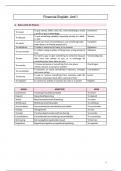Financial English: Unit 1
A. Basic verbs for finance
To put money, effort, time, etc. into something to make Investeren
To invest
a profit or get an advantage
To put something valuable, especially money, in a bank Storten
To deposit
or safe
To use too much of something or use something badly Verspillen
To waste
when there is a limited amount of it
To withdraw To take or move out or back, or to remove Opnemen
To collect a large number of things over a long period of Ophopen
To accumulate
time
To need to pay or give something to someone because Verschuldigd zijn
To owe they have lent money to you, or in exchange for
something they have done for you
To move someone or something from one place, Overdragen
To transfer
vehicle, person, or group to another
To become, or cause something to become, stronger, Consolideren
To consolidate
and more certain
To get or receive something from someone with the Lenen
To borrow
intention of giving it back after a period of time
To regulate To control an activity or process by rules or a system Regelen
NOUN ADJECTIVE VERB
Investment Investing/invested/investable To invest
Deposit Deposited/depositing To deposit
Waste Wast/wasted/wasteful/wasting To waste
Withdrawal Withdrawn/withdrawable To withdraw
Accumulation Accumulative/accumulated/accumulable To accumulate
Owings Owing/owed To owe
Transfer Transferrable/transferred/transferring To transfer
Consolidation Consolidated/consolidating/consolidatable To consolidate
Borrowing Borrowing/borrowable/borrowed To borrow
Regulation Regulative/regulatory/regulated/regulating To regulate
1
, B. Commonly confused words
A fixed amount of money agreed every year as pay for an employee, usually paid
Salary
directly into his or her bank account every month
Wages The money earned by an employee, especially when paid for the hours worked
Salary employees usually earn a specific amount over an entire year, whereas
Difference
waged employees earn by the hour or piece of work
Net income A person's or company’s income after all tax and other costs have been paid
Revenue The income that a government or company receives regularly
Revenue refers to the sum of money the company generates from doing the
business in the normal course of operations from its customers. In contrast, net
Difference
income refers to the income earned by the company or the income left over in
the company after deducting all the period’s expenses from the net revenue
To give something to someone for a short period of time, expecting it to be given
Lend
back
To get or receive something from someone with the intention of giving it back
Borrow
after a period of time
Lend means to give something to someone to be used for a period of time and
then returned. Borrow means to take and use something that belongs to
Difference
someone else for a period of time and then return it. The person lending
something owns it and is letting someone else use it
Obligation Something that you must do
Bonds are issued by governments and corporations when they want to raise
money. By buying a bond, you're giving the issuer a loan, and they agree to pay
Bond
you back the face value of the loan on a specific date, and to pay you periodic
interest payments along the way, usually twice a year
An obligation is something you must do while a bond is an amount of money that
an organization or government borrows and promises to pay back on an agreed
Difference
date with an agreed amount of interest, or the document that contains this
agreement
Liability The amount of money that a person or organization owes
Something that is owned by a person, company, or organization, such as money,
Asset
property, or land
Its simplest form, your balance sheet can be divided into two categories: assets
and liabilities. Assets are the items your company owns that can provide future
Difference
economic benefit. Liabilities are what you owe other parties. In short, assets put
money in your pocket, and liabilities take money out
2




